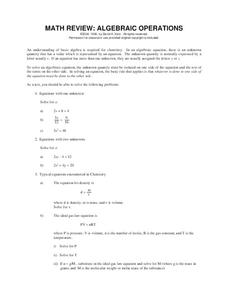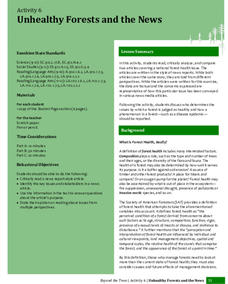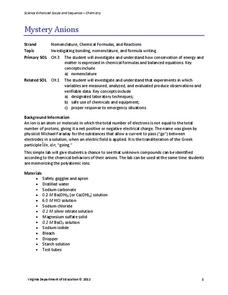Virginia Department of Education
Partial Pressure
At some point, everyone has been under pressure—even Dalton! Explore Dalton's law of partial pressures with young chemists as they measure the volume of air extracted from a sample compared to its original volume. Class...
Curated OER
Sum of Products and Product of Sums Expression
In this electrical circuit learning exercise, learners answer a series of 21 questions about sum of product and product of sum, and Boolean expression for a logic circuit. They design and build a circuit board using PC-board relays...
Curated OER
Math Review: Algebraic Operations
Need to prep your science learners in math? Here is a resource that serves as a review guide to support your scientists with the math they need to be successful in chemistry. Comes with basic algebraic problems and a review of...
DiscoverE
Paper Tower
Read all about it! Challenge your class to build taller and stronger. Newspapers provide the means to build towers in a simple activity. Scholars try to build as tall a tower as possible with just two sheets of newspaper.
Curated OER
Chapter 1: The Science of Biology
Provide young biologists with everything they need to excel in the study of lymphatics, the nervous system, hormones, cellular division, and more! Pupils utilize the workbook, complete with end-of-chapter assessment worksheets, to...
Teach Engineering
Bone Density Math and Logarithm Introduction
What do logarithms have to do with bone density? Scholars learn that the equation for bone density includes logarithms. The majority of the third instructional activity of seven is devoted to logarithms and their properties.
University of Florida
Unhealthy Forests and the News
Everyone knows a tree makes a sound when it falls, but what do we know about dying trees? Class members learn background information about Laurel wilt disease from a teacher-led presentation. Team members work with partners to read and...
Virginia Department of Education
Molar Volume of a Gas
What is a chemist's favorite plant? Stoichiome Tree! Scholars produce hydrogen gas by reacting magnesium with hydrochloric acid. Then they calculate the molar volume of the gas produced before answering assessment questions.
Curated OER
Variables and Expressions from Around the Cosmos
In this variables and expressions worksheet, students solve 7 problems using different mathematical formulae to find the length of Earth's day in the future, the distance to the galaxy Andromeda, the temperature of a gas cloud emitting...
Curated OER
Seesaw Balances
Students determine how the weights of 7 objects on a seesaw can vary and still be in balance. They also write equations in algebraic terms, how to change 3 variables in an equation expressed in algebraic terms to obtain the correct...
Virginia Department of Education
Equilibrium and Le Chatelier’s Principle
The best part of learning about equilibrium is that nothing changes. Young chemists observe four demonstrations during this lesson: equilibrium in a saturated solution, equilibrium with an acid-base indicator, equilibrium with cobalt...
Virginia Department of Education
Mystery Anions
Lost an electron? You should keep an ion them. Young chemists learn qualitative analysis in the second lesson of an 11-part chemistry series. After observing reactions of simple salts, the teacher provides pupils with unknown...
Virginia Department of Education
Acids and Bases
What did one titration say to the other titration? We should meet at the end point! Young chemists perform four experiments: dilute solution, neutralization, titration, and figuring pH/pOH.
DiscoverE
Hoop Glider
Fly into an engineering lesson sure to get your scholars' interest off the ground. Young pupils create hoop gliders out of straws and paper hoops. Adjusting the size and number of the hoops lets them investigate the effect on flight...
Curated OER
Thermodynamic Equilibrium Constants
In this chemistry worksheet, students examine the concept of thermodynamic equilibrium constants with intense detail. The application of the knowledge is practiced with problem solving.
Curated OER
Active Loads in Amplifier Circuits
In this electrical worksheet, students answer a series of 7 open-ended questions with schematics about active loads in amplifier circuits. This worksheet is printable and the answers are available on-line.
Curated OER
Basic Algebra and Graphing for Electric Circuits
In this electronics activity, students evaluate mathematical expressions to complete 16 short answer and problem solving questions.
Ohio State University
Ohm's Law
Have you ever wanted to build a conductor? Here is a lesson that takes pupils through building a conductor based on Drude's model in order to better understand electricity.
Curated OER
The Ideal Gas law, Molar Mass and Density
In this ideal gas law, molar mass and density worksheet, students read about how the molar mass and density of a gas can be determined from the ideal gas law. They solve five problems using the ideal gas law to find the pressure,...
Virginia Department of Education
Determining Absolute Age
How can radioactive decay help date old objects? Learners explore half-life and radioactive decay by conducting an experiment using pennies to represent atoms. Young scientists graph data from the experiment to identify radioactive decay...
Curated OER
Introduction to Graphical Representation of Data Sets in Connection with Nuclear Decay
Students record data, make observations, and share in experimentation and discussion of numerical experiments.
Curated OER
Literal Equations
Students explore Literal Equations. In this literal equations lesson plan, students use the Internet to connect to links and solve linear equations. Students investigate, analyze and record their findings on various activity worksheets.
Curated OER
Introduction to Graphical Representation of Data Sets in Connection to Cellular Growth
Learners practice graphing relationships between variables by studying topics such as exponential growth and decay. They conduct a series of numerical experiments using a computer model and a variety of physical experiments using mold,...
Virginia Department of Education
The Rate of a Chemical Reaction
If your pupils think a catalyst is a list of their cats, then this might be the lesson for you! Young chemists study the effect of temperature, catalysts, concentration, and particle size on reaction rates during four different...























